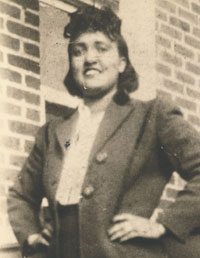
Johns Hopkins University announced it will name a new research building on campus in honor of Henrietta Lacks, whose “immortal cells” led to the development of the polio vaccine, studies of leukemia and AIDS, chemotherapy and in vitro fertilization research as well as the effects of zero gravity in space.
“This building will be a place that stands as an enduring and powerful testament to a woman who not only was the beloved mother, grandmother and great-grandmother to generations of the Lacks family, but the genesis of generations of miraculous discoveries that have changed the landscape of modern medicine and that have benefited, in truth, the much larger family of humanity,” Johns Hopkins University President Ronald J. Daniels said Saturday during the university’s ninth annual Henrietta Lacks Memorial lecture series.
Construction of the new building, which will be adjacent to the university’s Berman Institute of Bioethics’ Deering Hall in East Baltimore, will be the site of further study “to promote research ethics and community engagement,” the university said.
We need to plan, coordinate and collaborate so that tomorrow’s new technologies don’t happen to cities but rather for them.
Lacks’s cells, dubbed “HeLa cells” by the scientific community, have been the subject of a best-selling book,The Immortal Life of Henrietta Lacks, by Rebecca Skloot and a television movie, starring Oprah Winfrey as Henrietta Lacks’s daughter Deborah Lacks.
[Can the ‘immortal cells’ of Henrietta Lacks sue for their own rights?]
The cells have also been the center of ongoing controversy over whether the family should receive financial proceeds from their sale. In June, a lawyer representing Lawrence Lacks, the eldest son of Henrietta Lacks, told The Washington Post she planned to file a petition seeking “guardianship” of the cells.
“The question we are dealing with is, ‘Can the cells sue for mistreatment, misappropriation, theft and for the profits earned without their consent?’” said Christina J. Bostick, who is representing Lawrence Lacks and grandsons Lawrence Lacks Jr. and Ron Lacks.
Bostick told The Post the cells were taken without consent from Lacks, an African American mother of five, during a 1951 visit to Johns Hopkins Hospital in Baltimore, which was racially segregated at the time. Lawrence Lacks, the executor of Lacks’s estate, said the family did not know until many years after his mother’s death that her cells were living in test tubes in science labs across the world.
[On the eve of an Oprah movie about Henrietta Lacks, an ugly feud consumes the family]
Because the statute of limitations for medical malpractice expired years ago, Bostick said, she decided to use “creative litigation” to help family members regain some control of Lacks’s cells, which have been reproduced billions of times for medical research.
The question of who owns the cells, she said, is complicated. “I think the answer is, no one legally owns the cells as one whole entity,” she said. Bostick said the cells can be purchased on an open market, “so the purchaser owns the rights to the cells it acquires.”
Johns Hopkins has said it claims no ownership rights to the cells “because the cells cannot legally be patented,” Bostick said. The National Institutes of Health regulates the use of the human genome completed based on the cells, she said.
Lacks was a young housewife when she went to Johns Hopkins Hospital in Baltimore for bleeding. Physicians discovered a malignant tumor on her cervix and collected cells from the tumor without her knowledge or consent, according to a report by Johns Hopkins Medicine titled “The Legacy of Henrietta Lacks.”
Lacks died on Oct. 4, 1951, at 31, but her cells continued to live. Scientists in the lab discovered to their amazement that unlike the cells they had collected in other experiments, which expired almost immediately outside the human body, Lacks’s cells doubled in growth every 20 to 24 hours, according to a report by Johns Hopkins Medicine.
The line of cells would go on to contribute to significant advances in scientific research, leading to two Nobel Prizes in research and the development of vaccines, cancer treatments and a genome sequence that was published last year. The cells have been used in the research of toxins, hormones and viruses and to study the effects of radiation.
“There are 17,000 U.S. patents that involve HeLa cells, which are theoretically continuing to make money,” Bostick said.
I n 2017, Johns Hopkins University released a statement denying it had profited from the cells. “Johns Hopkins never patented HeLa cells, and therefore does not own the rights to the HeLa cell line,” the statement said.
Johns Hopkins explained that when the cells were taken from Lacks in 1951, there was no established protocol for informing patients or getting consent for research of cell or tissue specimens.
“Today, Johns Hopkins and other medical research centers maintain strict patient consent processes for tissue and cell donation,” Johns Hopkins said. But scientists across the world have used the cells in research. In 2013, scientists in Germany published a paper announcing they had sequenced the entire genome of a HeLa cell, “essentially putting Lacks’s DNA sequence up on the Internet for all to see,” according to the Guardian newspaper.
That year, in 2013, the National Institutes of Health announced that two members of the Lacks family would sit on the panel that reviews applications for the genome data and would control access to HeLa cells.
Read more on Retropolis:
When Henrietta Lacks had cervical cancer, it was a ‘death sentence.’ Her cells would help change that.
A surgeon experimented on slave women without anesthesia. Now his statues are under attack.
‘You’ve got bad blood’: The horror of the Tuskegee syphilis experiment
Guinea pigs or pioneers? How Puerto Rican women were used to test the birth control pill.
The first woman to start a bank — a black woman — finally gets her due in the Confederacy’s capital


Be the first to comment